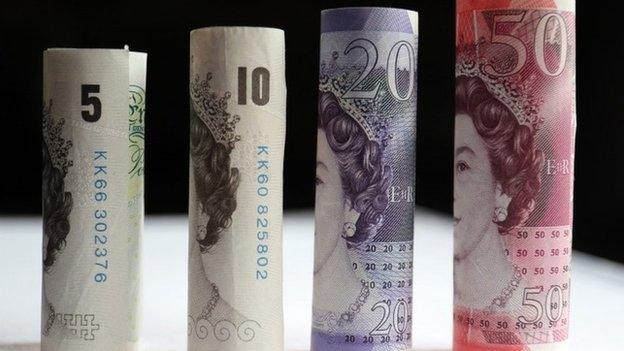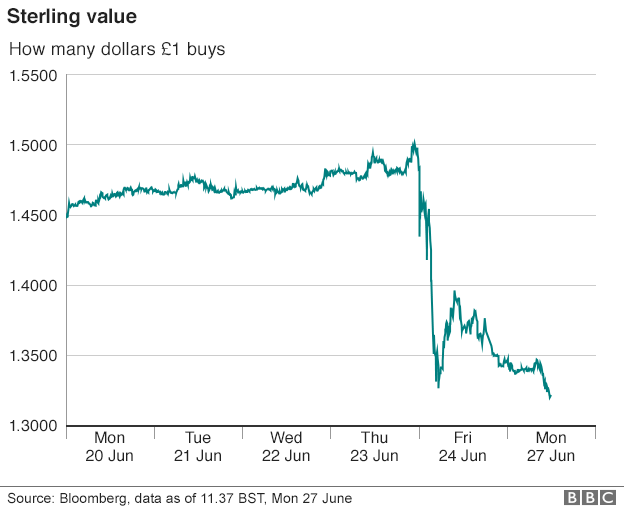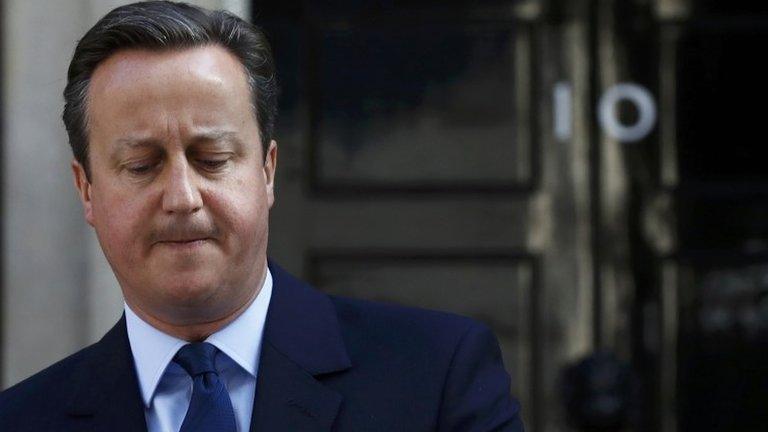Ratings agencies downgrade UK credit rating after Brexit vote
- Published

The UK has lost its top AAA credit rating from ratings agency S&P following the country's Brexit vote.
S&P said the the referendum result could lead to "a deterioration of the UK's economic performance, including its large financial services sector".
Rival agency Fitch lowered its rating from AA+ to AA, forecasting an "abrupt slowdown" in growth in the short-term.
The moves come after Chancellor George Osborne said the UK will face the future "from a position of strength".
Speaking earlier, in an attempt to restore calm to the markets, the chancellor said the economy would need to "adjust" but was strong enough to cope.
S&P had been the only major agency to maintain a AAA rating for the UK. It has now cut its rating by two notches to AA.
On Friday, Moody's cut the UK's credit rating outlook to negative.
A rating downgrade can affect how much it costs governments to borrow money in the international financial markets. In theory, a high credit rating means a lower interest rate (and vice versa).
S&P said that the leave result would "weaken the predictability, stability, and effectiveness of policymaking in the UK".

Analysis: Andrew Walker, BBC economics correspondent
Other things being equal, a downgrade can mean higher borrowing costs. But this time other things are not equal at all.
Since the event which led to the downgrade - the referendum - those costs have gone down.
The risk associated with UK government debt or bonds might in some sense be a little higher than before, but they are still seen as a safe investment compared with other assets.
In a situation where investors have become more reluctant to hold risky assets they buy safer ones including government bonds and that tends to lower the interest rate the government has to pay when it next goes to the market to borrow.
And then there is the increased chance that the Bank of England will reduce its own interest rates because of concerns about the economic impact of Brexit. That tends to push government borrowing costs in the same direction.

'Deep divisions'
Fitch expects an abrupt slowdown in UK growth in the short term.
But it also warned that medium term growth is likely to be weaker "due to less favourable terms for exports to the EU, lower immigration and a reduction in foreign direct investment".
S&P also warned that it expected the UK economic growth to be hit by the outcome of the vote.
It said that there was a risk of "a constitutional crisis" if the referendum's outcome leads to a second referendum on Scottish independence from the UK.
"We take the view that the deep divisions both within the ruling Conservative Party and society as a whole over the european question may not heal quickly and may hamper government stability and complicate policymaking on economic and other matters," it said.
S&P also warned uncertainty on key issues about the UK's exit from the EU would hurt investor confidence and put vital external investment "at risk".

Prime Minister David Cameron, speaking earlier in the Commons said negotiating an exit from the European Union would be the civil service's most complex and important task for decades.
Mr Cameron, who has said he will step down by October, also told MPs he did not take back the warnings he made during the campaign about the consequences of leaving the EU, saying it would be "difficult" with "challenging new negotiations" ahead.
Meanwhile, Germany, France and Italy have said they will not hold informal talks with the UK until it triggers the official Article 50 mechanism notifying the rest of EU of its intention to leave.
- Published28 June 2016
- Published25 June 2016

- Published25 June 2016

- Published27 June 2016

- Published27 June 2016
